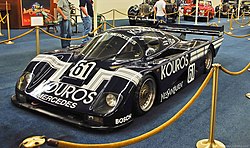 | |||||||||
| Category | Group C Prototype | ||||||||
|---|---|---|---|---|---|---|---|---|---|
| Constructor | Sauber Motorsport | ||||||||
| Designer(s) | Peter Sauber | ||||||||
| Predecessor | Sauber C7 | ||||||||
| Successor | Sauber C9 | ||||||||
| Technical specifications | |||||||||
| Chassis | Light alloy monocoque | ||||||||
| Suspension (front) | double wishbones, coil springs over shock absorbers, torsion bar stabilizer | ||||||||
| Suspension (rear) | double wishbones, coil springs over shock absorbers, torsion bar stabilizer | ||||||||
| Length | 189 in (480.1 cm) | ||||||||
| Width | 78 in (198.1 cm) | ||||||||
| Height | 42.1 in (106.9 cm) | ||||||||
| Axle track | 63 in (160.0 cm) | ||||||||
| Wheelbase | 106.3 in (270.0 cm) | ||||||||
| Engine | Mercedes-Benz M117 5.0 L Turbo 90° V8 Twin KKK turbos Mid, longitudinally mounted | ||||||||
| Transmission | 5-speed Manual | ||||||||
| Weight | 870 kg (1,918.0 lb) | ||||||||
| Fuel | Bosch Motronic MP 1.2 Fuel Injection | ||||||||
| Tyres | Dunlop, Goodyear | ||||||||
| Competition history | |||||||||
| Notable entrants | |||||||||
| Notable drivers | |||||||||
| Debut | 1985 24 Hours of Le Mans | ||||||||
| |||||||||
| Teams' Championships | 0 | ||||||||
| Constructors' Championships | 0 | ||||||||
| Drivers' Championships | 0 | ||||||||
The Sauber C8 was a Group C prototype race car introduced in 1985 for the 24 Hours of Le Mans as the first in a partnership between Sauber and Mercedes-Benz.
Design
[edit]Mercedes decided not to put forth the money for a full effort on their own until they had time to develop the production-based M117 5.0L Turbocharged V8. Therefore, Mercedes turned to Sauber to create a chassis for them and initially to run the team before Mercedes took on a larger role. Sauber chose to evolve the previous C7 prototype for the C8, although modifications were needed to house the larger V8 instead of the C7's previous Inline-6.
Racing history
[edit]In its debut at the 1985 24 Hours of Le Mans, Sauber was able to qualify 17th. However, an accident at the Mulsanne Straight with John Nielsen at the wheel caused enough damage that the car was not able to participate in the race.[1] The team promised to appear at a few more races in the World Sportscar Championship season, but never showed.
For 1986, the team became known as Kouros Racing Team, and the C8 was entered in the full season of the 1986 World Sportscar Championship season. For the first two races the C8 showed promise, with an 8th and a 9th. However, later in the season two C8s were entered in the 1986 24 Hours of Le Mans where neither car finished. For the 1000km of Nürburgring, the team was able to achieve its first victory[2] with drivers Henri Pescarolo and Mike Thackwell,[3] made all the more important by being won in front of the Mercedes-Benz executives in attendance. With this victory the Kouros Racing Team was able to end the season 5th in the teams championship.
In 1987, the Kouros team switched to the newer Sauber C9, while C8 chassis #2 was sold to privateer French team Noël del Bello, which entered the 1987 24 Hours of Le Mans and 1000km of Nürburgring, but failed to finish either race. Noël del Bello continued into 1988, but failed to finish any of the races it entered again.
Complete 24 Hours of Le Mans results
[edit]| Year | Class | No. | Team | Drivers | Laps | Pos. | Class Pos. |
|---|---|---|---|---|---|---|---|
| 1985 | C1 | 61 | — | DNS | DNS | ||
| 1986 | C1 | 61 | 61 | DNF | DNF | ||
| C1 | 62 | 86 | DNF | DNF | |||
| 1987 | C1 | 42 | 4 | DNF | DNF | ||
| 1988 | C1 | 42 | 157 | DNF | DNF |
† Privateer team
See also
[edit]References
[edit]- ^ "Hold Onto Your Jaws: A Sauber Mercedes C9 Has Hit The Market @ Top Speed". Top Speed. 2020-07-23. Retrieved 2021-08-08.
- ^ "The five coolest cars at the 2019 Monza Historic". www.goodwood.com. Retrieved 2021-08-08.
- ^ "Sauber's half centenary". Historic Racing Technology. 2020-05-11. Retrieved 2021-08-08.